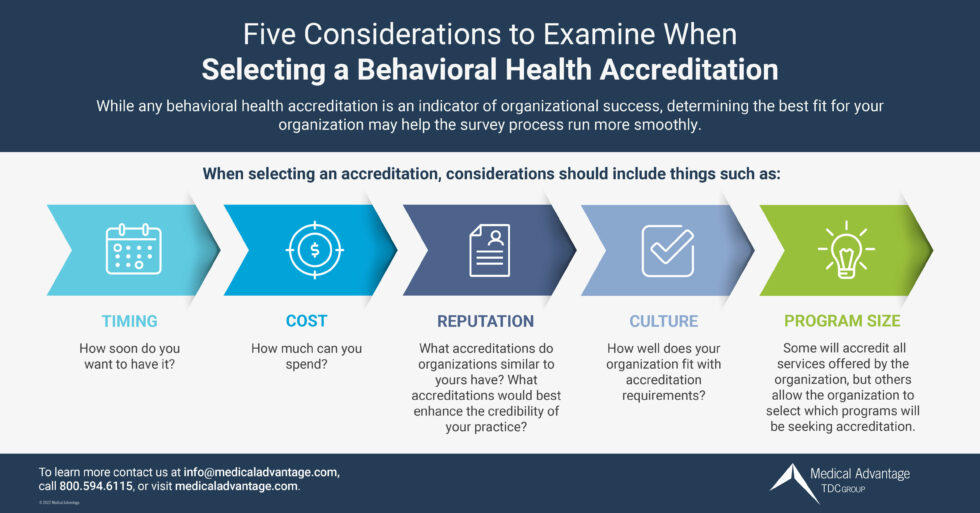Why Should Your Organization Care About Behavioral Health Accreditation?
Is Your Organization Meeting Behavioral Health Standards?
What Are the Three Major Accreditation Organizations?
What is the Survey Process in Accreditation?
Build a Team and a Plan for Achieving Accreditation
Maintaining Your Accreditation
Speak with one of our Healthcare Experts today.
For healthcare organizations, accreditation matters. But why is accreditation important to your behavioral health practice? Behavioral health accreditation is a way for organizations to demonstrate a commitment to quality and compliance. It allows other stakeholders, providers, and patients/clients to feel confident that an organization’s programs and services are consistent with well-established standards of practice and care.
Why Should Your Organization Care About Behavioral Health Accreditation?
While the process may seem overwhelming and time-consuming, going through this process will both help highlight your strengths and drive continuous improvement. It demonstrates a commitment to improving patient/client outcomes and ensures safety. It helps put you at the forefront of behavioral health providers which promises to positively impact business and revenue, while also reducing risk. It often makes program credentialing and licensing less cumbersome.
Whether your organization is non-profit or for-profit, behavioral health accreditation is worth pursuing. Also, with a greater focus on value-based care, it may only be a matter of time before accreditation becomes mandated – being ahead of the curve is far better than being behind it.
So, where do you start?
Is Your Organization Meeting Behavioral Health Standards?
First and foremost, you should have a sense of what your programs are doing well, but also what they are not doing well in terms of operations as well as patient/client care. Usually, the leadership of an organization are the ones who determine that the organization should become accredited.
In many cases, leadership lacks awareness of what is happening in day-to-day operations and interactions with patients/clients, stakeholders, community members, etc., so it is important that whoever is making the decision to become accredited has an accurate picture of the program’s challenges or deficits.
What Are the Three Major Accreditation Organizations?
Next, you should determine what accrediting agency you would like to become accredited by. There are three main behavioral health accrediting agencies: The Joint Commission (TJC), Commission on Accreditation of Rehabilitation Facilities (CARF), and Council on Accreditation (COA).
When selecting an accreditation, considerations should include things such as:
- Timing: How soon do you want to have it?
- Cost: How much can you spend?
- Reputation: What accreditations do organizations similar to yours have? What accreditations would best enhance the credibility of your practice?
- Culture: How well does your organization fit with the requirements?
- Number of programs or program size: Some will accredit all services offered by the organization, but others allow the organization to select which programs will be seeking accreditation status.
While any behavioral health accreditation is an indicator of organizational success, determining the best fit for your organization may help the survey process run more smoothly.

What is the Survey Process in Accreditation?
The survey process begins with an organization’s commitment to the accrediting body’s standards, and a request for survey through the avenues specific to the types of accreditation. A survey team comprised of industry peers and other professionals with a background in healthcare will observe operational practices, review documentation, and assess service delivery. The surveyors may also interview different staff, patients receiving services, and family members of patients receiving services to evaluate conformance to the mental health standards.
Build a Team and a Plan for Achieving Accreditation
Once you have selected an accreditor, you should determine who will be part of the accreditation team. You will need to dedicate time (plan for one year minimum as a timetable) and resources to the process of accreditation regardless of how well your organization is performing. Obtaining behavioral health accreditation will have a positive ROI (return on investment) but skimping on the resources to get there will not.
When you assemble your team, consider including staff from each of your organization’s different departments, programs, or committees, including senior, middle, and first-line managers. Also, consider including patient/client-facing staff.
Encourage “buy-in” among your organization from the top down. A common pitfall in the process of obtaining accreditation is when the staff does not understand why accreditation is important, or know why it should matter to them. While employees may embrace the idea of quality patient/client care, the survey process requires more than that. Enthusiasm staff (rather than resistance or apathy) will help create an atmosphere cooperative with any changes that may need to take place as part of the process.
To supplement your accreditation team, you may need to hire an outside consultant or project manager for behavioral health accreditation. Not having thorough project management or team members who understand the accrediting body’s mental health standards will make the process difficult, if not altogether unattainable. Having a team dedicated to accreditation as their primary focus will produce more timely and desirable outcomes.
Bear in mind that in the medical or human services fields, the prevalence of staff shortages can be high. It may be unrealistic to use existing staff (who are already stretched thin) for these tasks. You may need to create a dedicated position for the accreditation process or find ways to free up time for existing staff. It is also unrealistic for leadership to be “hands-off” and expect to still be successful.
Next, it is time to get to work. Contact the accrediting body you have chosen and request materials or any information you will need to participate in the survey and certification process. Get your team together to review those materials, and from there, conduct a mock survey (or self-assessment).
Certain behavioral health accreditation types require programs to be in conformance for a period of time prior to the on-site survey so this process cannot be rushed.
Be prepared to:
- Review existing organizational plans, as well as policies and procedures, and write new ones as needed – prioritize quality education and improvement, risk management & strategic planning.
- Develop new or additional systems for tracking.
- Make changes and improvements to meet the standard, including supplemental staff training no matter how well your organization is performing.
Maintaining Your Accreditation
Accreditation work is not finished once you have received it. Accreditation periods vary depending on the type of accreditation you choose. At some point, you will be required to recertify to maintain your accreditation status. While the initiation certification is far more time and resource-consuming, you best not assume that if nothing has changed you will breeze through recertification.
Behavioral health accreditation means you are committed to specific standards of care. Program improvement and conformance to behavioral health standards of practice should be ongoing and you should ensure you are familiar with any changes to the standards prior to submitting for recertification.
Medical Advantage Can Help
The survey and certification process of accreditation is a great opportunity to learn more about the area of behavioral health and to ultimately improve your practice while elevating organizational performance as a whole. The task of getting there may seem daunting, but Medical Advantage’s healthcare consultants experienced in behavioral health are available to help you on your path toward excellence and building your reputation. If you are looking into accreditation options, contact us for a no-obligation call to discuss your plans.





